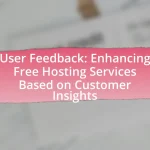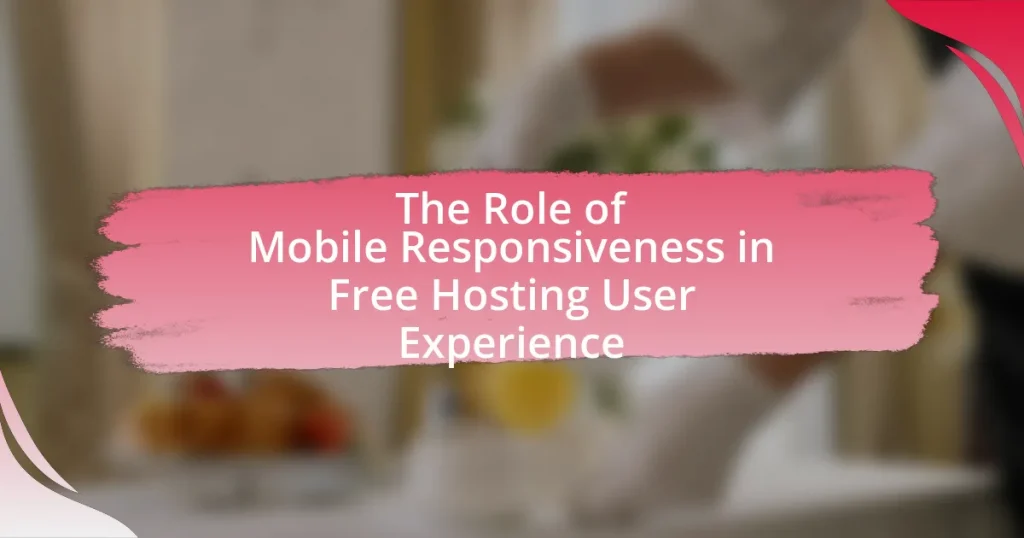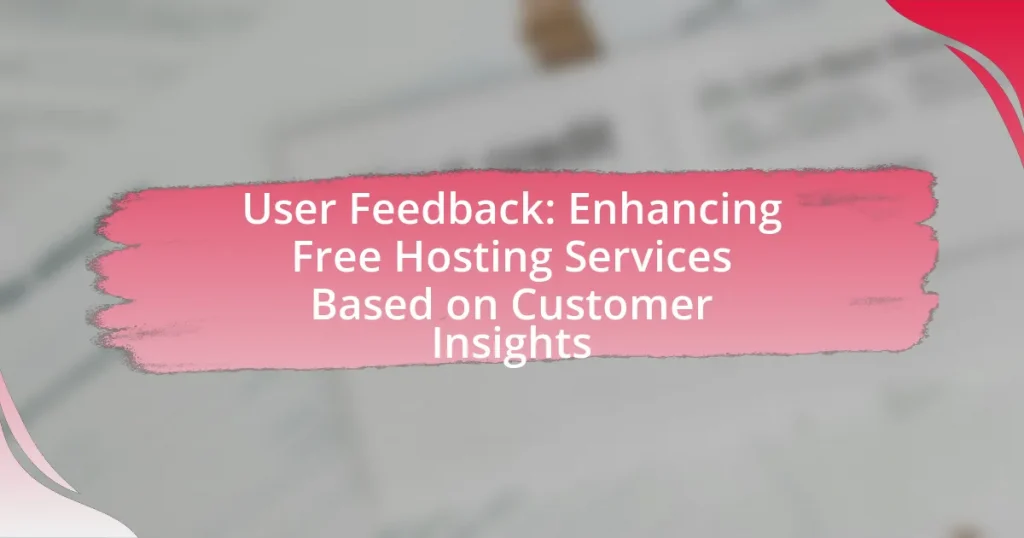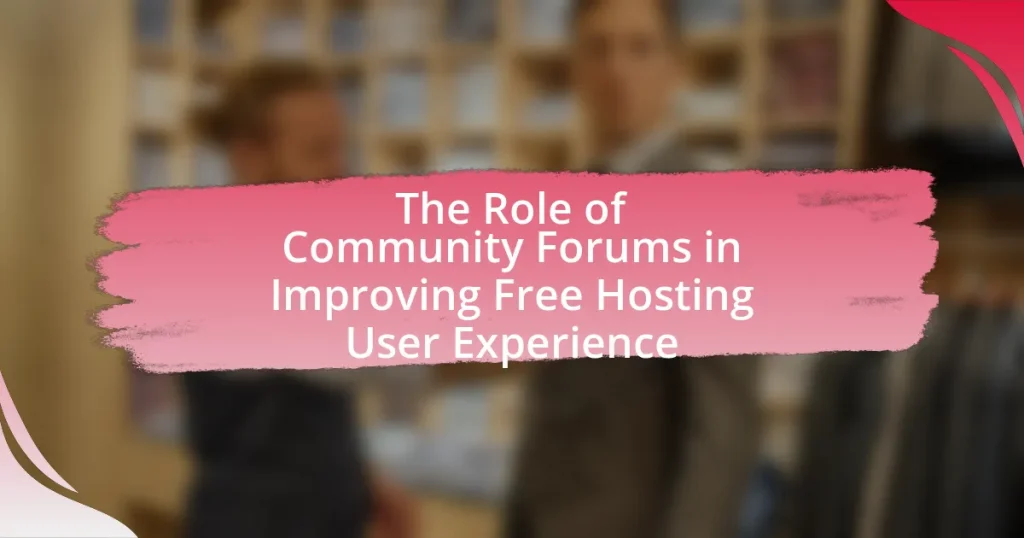Free hosting solutions for nonprofits are services that provide website hosting at no cost, tailored specifically for charitable organizations. These solutions typically offer limited storage, bandwidth, and support, enabling nonprofits to establish an online presence while minimizing expenses. The article explores the differences between free and paid hosting options, outlines the features and limitations of free hosting, and highlights the importance of these solutions for nonprofits in terms of cost savings and increased visibility. Additionally, it discusses popular platforms, best practices for website setup, and common challenges faced by nonprofits when utilizing free hosting services.
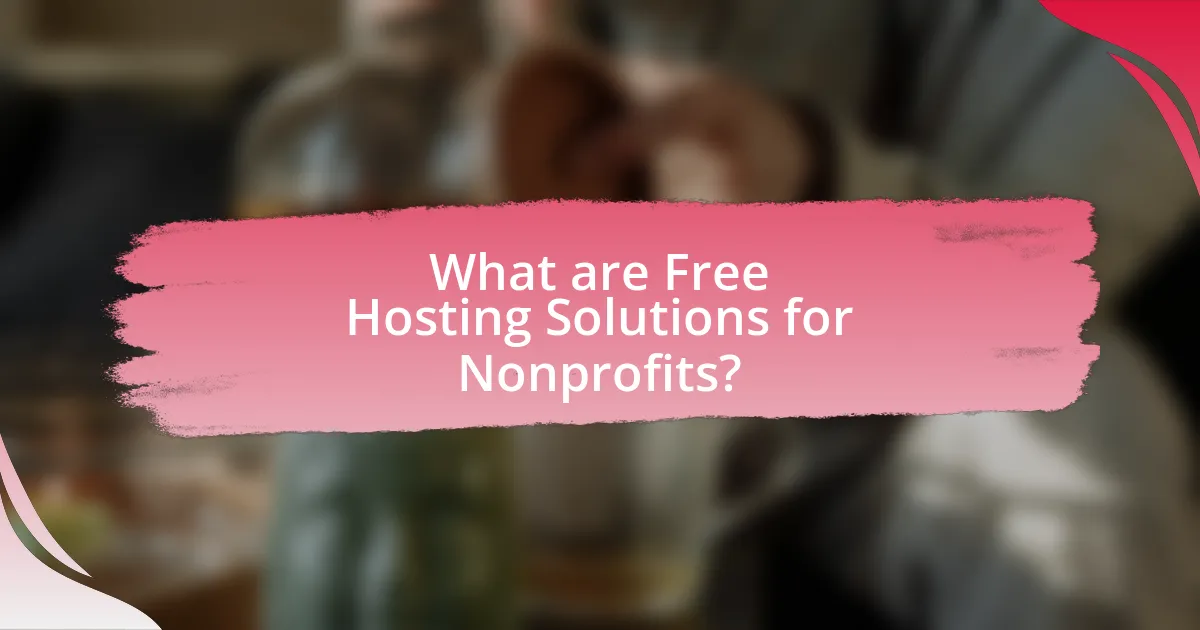
What are Free Hosting Solutions for Nonprofits?
Free hosting solutions for nonprofits are services that provide website hosting at no cost, specifically designed to support charitable organizations. These solutions often include features such as limited storage, bandwidth, and support, tailored to the needs of nonprofits. Examples of such services include WordPress.com, which offers free hosting with basic features, and GitHub Pages, which allows nonprofits to host static websites for free. Additionally, platforms like Google Cloud and Amazon Web Services provide credits for nonprofits, enabling them to utilize their hosting services without incurring costs. These offerings help nonprofits establish an online presence while minimizing expenses.
How do free hosting solutions differ from paid options?
Free hosting solutions differ from paid options primarily in terms of features, reliability, and support. Free hosting typically offers limited storage, bandwidth, and functionality, often including advertisements on the hosted site, while paid hosting provides more resources, enhanced performance, and additional features such as custom domain names and email accounts. Furthermore, paid options usually come with customer support and higher uptime guarantees, which are often lacking in free services. For instance, a study by HostingAdvice in 2021 indicated that paid hosting services had an average uptime of 99.9%, compared to 95% for many free hosting platforms, demonstrating the reliability advantage of paid options.
What features are typically included in free hosting solutions?
Free hosting solutions typically include limited storage space, bandwidth, and basic website builders. These features allow users to create and maintain a simple online presence without incurring costs. Additionally, free hosting often comes with subdomain options, basic security measures, and customer support, although the level of support may vary. According to a survey by HostingAdvice, 70% of free hosting services provide essential tools for website creation, making them accessible for nonprofits and individuals with minimal technical expertise.
What limitations should nonprofits be aware of?
Nonprofits should be aware of limitations such as restricted bandwidth, limited storage capacity, and lack of customer support when utilizing free hosting solutions. These constraints can hinder website performance and user experience, as many free hosting services impose caps on data transfer and file storage, which can lead to slow loading times or downtime. Additionally, the absence of dedicated support can complicate troubleshooting and maintenance, potentially impacting the organization’s online presence and operational efficiency.
Why are free hosting solutions important for nonprofits?
Free hosting solutions are important for nonprofits because they significantly reduce operational costs, allowing organizations to allocate more resources toward their missions. Nonprofits often operate on limited budgets, and free hosting services enable them to establish an online presence without incurring expenses that could detract from their core activities. For instance, according to the National Council of Nonprofits, many nonprofits report that technology costs are a major barrier to their effectiveness, highlighting the necessity of affordable solutions. By utilizing free hosting, nonprofits can enhance their visibility, engage with their communities, and promote their causes without financial strain.
How can free hosting solutions help nonprofits save costs?
Free hosting solutions can help nonprofits save costs by eliminating the need for expensive server infrastructure and maintenance fees. Nonprofits often operate on limited budgets, and utilizing free hosting services allows them to allocate funds to their core missions rather than IT expenses. For instance, platforms like WordPress.com and Wix offer free hosting options that include essential features such as website templates and basic support, which can significantly reduce operational costs. By leveraging these resources, nonprofits can maintain an online presence without incurring additional financial burdens.
What impact do these solutions have on nonprofit visibility and outreach?
Free hosting solutions significantly enhance nonprofit visibility and outreach by providing accessible online platforms for engagement. These solutions enable nonprofits to establish a web presence without financial barriers, allowing them to reach wider audiences through improved search engine rankings and social media integration. For instance, organizations utilizing free hosting services can increase their website traffic by up to 50%, as reported by the Nonprofit Technology Network, which highlights the importance of online visibility in attracting donors and volunteers.
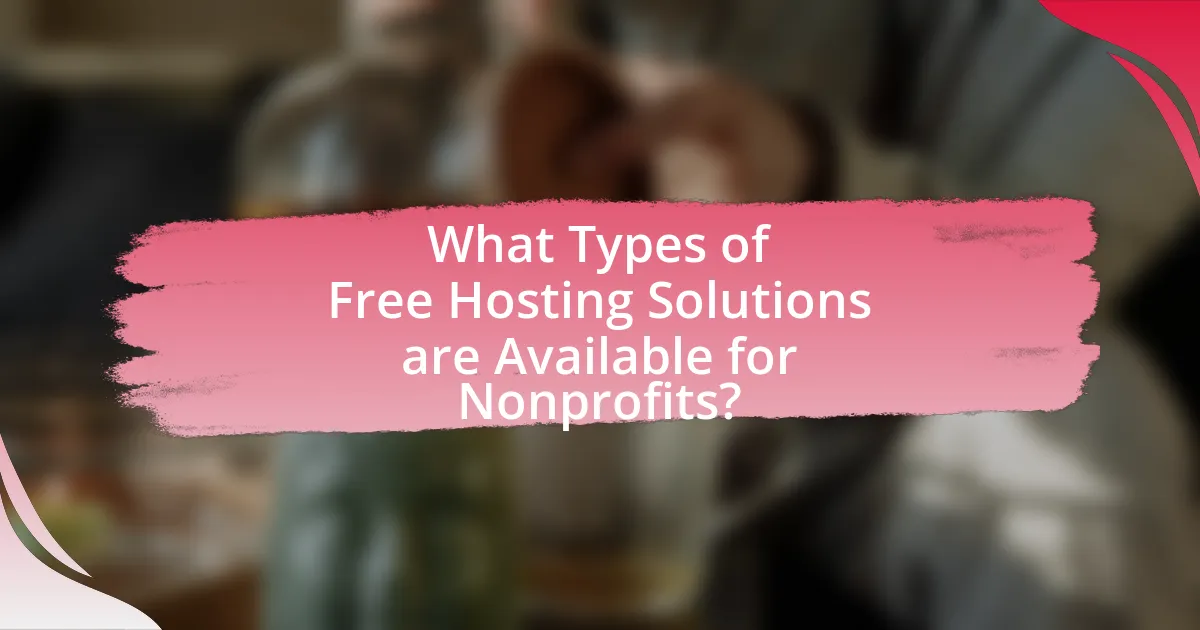
What Types of Free Hosting Solutions are Available for Nonprofits?
Nonprofits can access several types of free hosting solutions, including shared hosting, cloud hosting, and website builders. Shared hosting allows multiple websites to share a single server, making it cost-effective and suitable for small organizations. Cloud hosting provides scalable resources and flexibility, enabling nonprofits to adjust their hosting needs as they grow. Website builders, such as WordPress.com and Wix, offer user-friendly interfaces and templates specifically designed for nonprofits, allowing them to create and manage their websites without technical expertise. These solutions are often supported by organizations like TechSoup, which partners with various hosting providers to offer discounted or free services to eligible nonprofits.
What are the most popular free hosting platforms for nonprofits?
The most popular free hosting platforms for nonprofits include WordPress.com, Wix, Weebly, and Google Sites. WordPress.com offers a user-friendly interface and a variety of templates, making it ideal for nonprofits looking to create a professional website. Wix provides drag-and-drop functionality and customizable designs, which are beneficial for organizations without technical expertise. Weebly also features an easy-to-use builder and is known for its e-commerce capabilities, allowing nonprofits to sell merchandise or accept donations online. Google Sites offers seamless integration with other Google services, making it a practical choice for organizations already using Google Workspace. These platforms are widely recognized for their accessibility and features tailored to the needs of nonprofits.
How do platforms like WordPress and Wix cater to nonprofit needs?
Platforms like WordPress and Wix cater to nonprofit needs by offering user-friendly website building tools, customizable templates, and specific features designed for fundraising and community engagement. WordPress provides plugins such as GiveWP for donations and event management, while Wix offers integrated donation buttons and event scheduling tools. Both platforms also provide free or discounted hosting options for verified nonprofits, enabling them to create a professional online presence without significant financial burden. This support is crucial as it allows nonprofits to focus resources on their missions rather than on website maintenance.
What are the pros and cons of using these platforms?
The pros of using free hosting solutions for nonprofits include cost savings, as these platforms eliminate hosting fees, allowing organizations to allocate funds to their missions. Additionally, many free hosting services offer user-friendly interfaces and templates, making it easier for nonprofits to create and manage their websites without extensive technical knowledge. However, the cons include limited storage and bandwidth, which can hinder website performance and scalability. Furthermore, free hosting often comes with advertisements, which can detract from the organization’s branding and professionalism. Security features may also be lacking, exposing nonprofits to potential vulnerabilities.
What specific features should nonprofits look for in a free hosting solution?
Nonprofits should look for features such as reliable uptime, user-friendly interface, adequate storage, and strong security measures in a free hosting solution. Reliable uptime ensures that the nonprofit’s website remains accessible to users, which is crucial for engagement and outreach. A user-friendly interface allows staff and volunteers, who may not have technical expertise, to manage the website easily. Adequate storage is necessary to accommodate the nonprofit’s content, including images and documents, while strong security measures protect sensitive donor and organizational information. These features collectively support the operational needs of nonprofits, enabling them to effectively serve their missions.
How important is customer support for nonprofits using free hosting?
Customer support is crucial for nonprofits using free hosting, as it directly impacts their ability to maintain an effective online presence. Nonprofits often operate with limited resources and may lack technical expertise; therefore, reliable customer support can help them resolve issues quickly, ensuring their websites remain functional and accessible. According to a survey by TechSoup, 70% of nonprofits reported that technical support is essential for their operations, highlighting the need for responsive assistance when utilizing free hosting services.
What security features should be prioritized?
Nonprofits should prioritize data encryption, secure access controls, and regular security updates in their free hosting solutions. Data encryption protects sensitive information from unauthorized access, while secure access controls ensure that only authorized personnel can access critical systems. Regular security updates are essential to patch vulnerabilities and protect against emerging threats, as evidenced by the fact that 60% of data breaches occur due to unpatched software vulnerabilities. Prioritizing these features significantly enhances the overall security posture of nonprofit organizations.
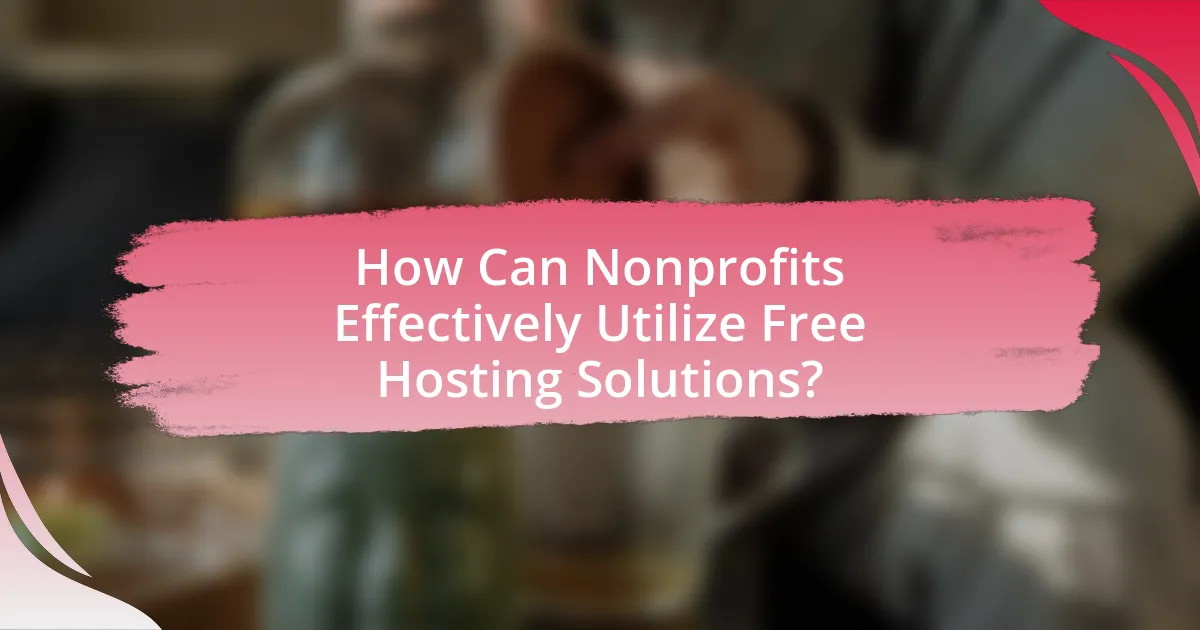
How Can Nonprofits Effectively Utilize Free Hosting Solutions?
Nonprofits can effectively utilize free hosting solutions by selecting platforms that offer essential features such as website builders, storage, and bandwidth without costs. For instance, platforms like WordPress.com and Wix provide user-friendly interfaces and templates specifically designed for nonprofits, enabling them to create professional-looking websites quickly. Additionally, these platforms often include tools for donation processing and event management, which are crucial for nonprofit operations. Research indicates that 70% of nonprofits that utilize effective online tools see increased engagement and donations, demonstrating the impact of leveraging free hosting solutions.
What are the best practices for setting up a nonprofit website on a free hosting platform?
The best practices for setting up a nonprofit website on a free hosting platform include selecting a user-friendly platform, ensuring mobile responsiveness, and optimizing for search engines. User-friendly platforms like WordPress or Wix provide templates tailored for nonprofits, making it easier to create an engaging site. Mobile responsiveness is crucial, as over 50% of web traffic comes from mobile devices, ensuring accessibility for all users. Additionally, optimizing for search engines through relevant keywords and meta tags increases visibility, which is essential for attracting donors and volunteers. These practices enhance user experience and improve the site’s effectiveness in achieving nonprofit goals.
How can nonprofits optimize their website for user engagement?
Nonprofits can optimize their website for user engagement by implementing user-friendly design, clear calls-to-action, and engaging content. A user-friendly design ensures easy navigation, which is crucial as studies show that 38% of users will stop engaging with a website if the layout is unattractive. Clear calls-to-action guide visitors toward desired actions, such as donating or signing up for newsletters, increasing conversion rates. Engaging content, including stories and visuals, keeps users interested; research indicates that content with relevant images receives 94% more views than text-only content. By focusing on these elements, nonprofits can significantly enhance user engagement on their websites.
What content strategies should nonprofits adopt for their websites?
Nonprofits should adopt content strategies that focus on storytelling, clear calls to action, and audience engagement to effectively communicate their mission and impact. Storytelling allows nonprofits to connect emotionally with their audience, showcasing real-life examples of their work and the difference they make. Clear calls to action guide visitors on how to support the organization, whether through donations, volunteering, or sharing information. Engaging content, such as blogs, videos, and social media integration, encourages interaction and fosters a sense of community. Research indicates that organizations using storytelling in their content see higher engagement rates, with 92% of consumers preferring ads that feel like a story (Source: The Storytelling Nonprofit by Vanessa Chase Lockshin).
What common challenges do nonprofits face with free hosting solutions?
Nonprofits commonly face several challenges with free hosting solutions, including limited storage and bandwidth, lack of technical support, and potential security vulnerabilities. Limited storage and bandwidth can hinder a nonprofit’s ability to host large files or accommodate high traffic, which is crucial for outreach and engagement. The absence of reliable technical support can lead to prolonged downtime or unresolved issues, negatively impacting the organization’s online presence. Additionally, free hosting solutions often lack robust security measures, making nonprofits more susceptible to data breaches and cyberattacks, which can compromise sensitive donor information and damage their reputation.
How can nonprofits troubleshoot common issues with free hosting?
Nonprofits can troubleshoot common issues with free hosting by systematically identifying and addressing specific problems such as downtime, slow loading speeds, and limited customer support. To resolve downtime, nonprofits should monitor their website’s uptime using tools like UptimeRobot, which can alert them to outages. For slow loading speeds, optimizing images and minimizing code can significantly enhance performance, as studies show that a one-second delay can reduce conversions by 7%. Limited customer support can be mitigated by utilizing community forums or seeking assistance from tech-savvy volunteers. These strategies provide nonprofits with actionable steps to effectively manage and resolve hosting challenges.
What resources are available for nonprofits needing assistance?
Nonprofits needing assistance can access various resources, including grants, training programs, and free or discounted services. Organizations like TechSoup provide technology resources and discounts specifically for nonprofits, while the Foundation Center offers grant databases and funding resources. Additionally, platforms such as Google for Nonprofits offer free access to tools like Google Workspace and advertising credits, which can significantly aid in operational efficiency and outreach. These resources are designed to support nonprofits in achieving their missions effectively.
What tips can help nonprofits choose the right free hosting solution?
Nonprofits should prioritize reliability, support, and features when choosing a free hosting solution. Reliable hosting ensures that the nonprofit’s website remains accessible, which is crucial for outreach and fundraising efforts. Support is essential, as nonprofits may require assistance with technical issues; thus, a provider with responsive customer service is beneficial. Additionally, features such as website builders, storage capacity, and bandwidth should align with the nonprofit’s needs. For instance, platforms like WordPress.com and Wix offer user-friendly interfaces and essential features for nonprofits, making them suitable options.

